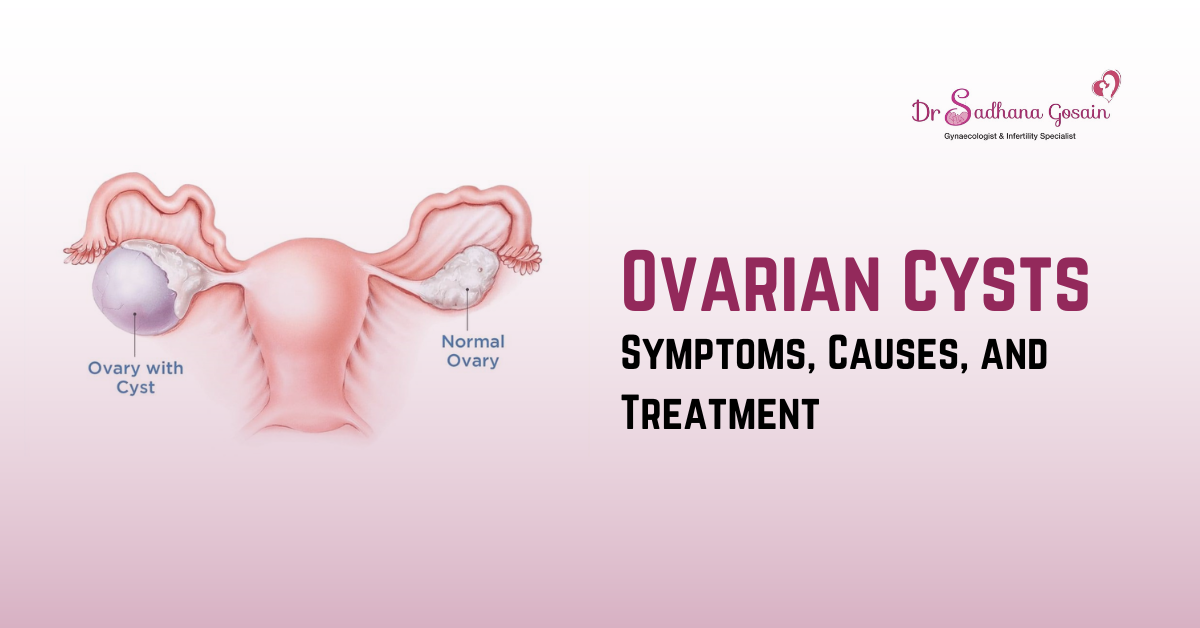Ovarian Cysts: Symptoms, Causes, and Treatment
Ovarian cysts are a common health concern among women, and while many cysts are harmless, some can cause significant discomfort or lead to complications.
This blog provides a patient-friendly guide to understanding ovarian cysts, their symptoms, causes, and treatment options.
What are Ovarian Cysts?
Ovarian cysts are fluid-filled sacs that develop on or within the ovaries. These cysts are usually benign and often resolve on their own without medical intervention. However, in some cases, they can grow larger, rupture, or cause other complications.
Symptoms of Ovarian Cysts
While some ovarian cysts are asymptomatic, others may cause noticeable symptoms. Common signs include:
- Pelvic Pain: A dull or sharp ache in the lower abdomen, often on one side.
- Bloating or Fullness: A sensation of heaviness or fullness in the abdomen.
- Irregular Menstrual Cycles: Changes in period length, flow, or frequency.
- Pain During Intercourse: Discomfort or pain during sexual activity.
- Frequent Urination: Pressure on the bladder causing the need to urinate more often.
- Difficulty Emptying the Bladder: A feeling of incomplete urination.
- Nausea or Vomiting: Particularly if the cyst ruptures.
If you experience severe pain, fever, dizziness, or rapid breathing, seek medical attention immediately, as these could indicate a ruptured cyst or ovarian torsion.
Types of Ovarian Cysts
There are several types of ovarian cysts, including:
- Functional Cysts: The most common type, formed during the menstrual cycle. These include:
- Follicular Cysts: Occur when the follicle doesn’t release an egg.
- Corpus Luteum Cysts: Form after the follicle releases an egg but fails to shrink.
- Dermoid Cysts: Contain tissues like hair, skin, or teeth.
- Endometriomas: Linked to endometriosis, where uterine tissue grows outside the uterus.
- Cystadenomas: Develop from ovarian tissue and may grow large.
- Polycystic Ovaries: Associated with PCOD/PCOS, where multiple small cysts form due to hormonal imbalances.
Causes of Ovarian Cysts
Several factors can contribute to the development of ovarian cysts, such as:
- Hormonal imbalances
- Endometriosis
- Pregnancy
- Pelvic infections
- Previous ovarian cysts
Diagnosis of Ovarian Cysts
To diagnose ovarian cysts, a gynecologist may perform:
- Pelvic Examination: Checking for abnormalities in the pelvic area.
- Ultrasound: Imaging to determine the size, location, and type of cyst.
- Blood Tests: To rule out cancerous growths (e.g., CA-125 test).
- Laparoscopy: A minimally invasive procedure to view the ovaries and remove cysts if necessary.
Treatment Options for Ovarian Cysts
1. Watchful Waiting
Small, functional cysts often resolve on their own and may only require regular monitoring.
2. Medications
- Hormonal Birth Control: To prevent new cyst formation.
- Pain Relievers: To manage discomfort.
3. Surgery
If the cyst is large, persistent, or causing complications, surgical removal may be recommended:
- Laparoscopy: Minimally invasive and preferred for smaller cysts.
- Laparotomy: Required for larger or complex cysts.
4. Lifestyle Changes
- Maintain a balanced diet
- Engage in regular physical activity
- Manage stress effectively
FAQs About Ovarian Cysts
1. Can ovarian cysts turn into cancer?
Most ovarian cysts are benign, but a small percentage may become cancerous. Regular check-ups can help detect any issues early.
2. Do ovarian cysts affect fertility?
While most cysts do not impact fertility, conditions like endometriomas or polycystic ovaries may pose challenges. Consult a gynecologist for personalized advice.
3. Can ovarian cysts be prevented?
While they can’t always be prevented, maintaining a healthy lifestyle and regular gynecological check-ups can help reduce the risk.
4. What is the difference between ovarian cysts and PCOD?
Ovarian cysts are individual sacs that may form for various reasons, while PCOD involves multiple small cysts due to hormonal imbalances.
5. Should I worry about ovarian cysts during pregnancy?
Most ovarian cysts during pregnancy are harmless, but some may require monitoring or treatment.
Book an Appointment with Dr. Sadhana Gosain
Dr. Sadhana Gosain is a leading gynecologist in Delhi with extensive experience in diagnosing and managing ovarian cysts. She provides compassionate, patient-focused care to address your concerns effectively.
Contact Details:
- Phone: +91 97111 46246
- Location: Delhi, India
Don’t wait for symptoms to worsen. Book your appointment today for expert care.
Final Thoughts
Ovarian cysts are a manageable condition with the right medical guidance and lifestyle adjustments. Early diagnosis and treatment can prevent complications and improve your quality of life. Reach out to a trusted gynecologist like Dr. Sadhana Gosain for personalized care and support.



